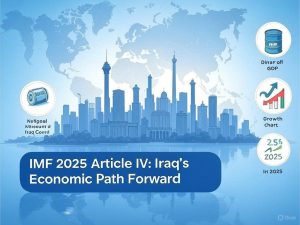Baghdad/Amman, May 15, 2025 – An International Monetary Fund (IMF) mission, led by Jean-Guillaume Poulain, concluded its 2025 Article IV consultation with Iraqi authorities in Amman and Baghdad from May 4–13, issuing a call for urgent reforms to address mounting economic vulnerabilities exacerbated by falling oil prices, fiscal pressures, and a volatile global environment.

Iraq’s vulnerabilities have increased in recent years due to a large fiscal expansion. Beside weighing on prospects of private sector-led growth, current public employment policies and resulting wage costs are unsustainable given Iraq’s low non-oil tax base.
Economic Slowdown and Rising Risks
Iraq’s economy faces significant headwinds, with non-oil GDP growth slowing to an estimated 2.5% in 2024 from 13.8% in 2023, driven by reduced public investment and a weaker trade balance. Overall GDP contracted by 2.3% due to lower oil production, while inflation remained low at 2.7%. The fiscal deficit widened to 4.2% of GDP in 2024, up from 1.1% in 2023, fueled by rising public sector wages and energy costs. The current account surplus shrank from 7.5% to 2% of GDP, and financing constraints have led to arrears in energy and capital spending.
Looking ahead, non-oil growth is projected to further decelerate to 1% in 2025, with declining oil revenues straining fiscal and external balances. Despite robust foreign reserves of $100.3 billion at end-2024, the IMF warns that without swift action, Iraq’s dependence on oil and unsustainable fiscal policies could jeopardize economic stability.
Urgent Policy Actions Needed
The IMF emphasizes the need for immediate measures to preserve fiscal and external stability:
-
Fiscal Consolidation: Contain the 2025 fiscal deficit by postponing non-essential spending, increasing non-oil revenues through revised customs duties and excise taxes, and avoiding monetary financing to prevent inflation and reserve depletion.
-
Revenue and Spending Reforms: Strengthen tax administration, reform personal income tax, and introduce a general sales tax. Curb public wage costs through hiring limits and pension system reforms, while improving targeting of social safety nets.
-
Energy Sector Overhaul: Address chronic power shortages and 55% distribution losses by deploying smart meters, enhancing billing, and gradually increasing electricity tariffs with targeted subsidies for low-income households.
-
Financial Sector Modernization: Finalize state-owned bank restructuring, enhance private bank roles, and continue Central Bank of Iraq (CBI) efforts to modernize trade finance and reduce exchange rate spreads.
Structural Reforms for Long-Term Growth
To unlock Iraq’s growth potential, the IMF advocates a comprehensive reform agenda to double non-oil GDP growth over the medium term:
-
Private Sector Development: Simplify business regulations, improve governance, and combat corruption through stronger accountability and compliance with transparency standards.
-
Labor Market Reforms: Increase female participation, align skills with market needs, and reduce public sector hiring distortions.
-
Infrastructure and Energy: Boost capital spending on trade, transportation, and electricity, while developing natural gas resources to reduce import dependence.
Commitment to Collaboration
“The mission’s discussions with Iraqi authorities were candid and productive,” said Mr. Poulain. “We commend recent progress, including the CBI’s trade finance reforms and anti-corruption efforts, but urgent action is needed to navigate the challenging economic landscape and foster sustainable growth.”
The IMF team expressed gratitude for the Iraqi authorities’ hospitality and cooperation. A detailed report based on these findings will be presented to the IMF Executive Board for further discussion.
Contact: For media inquiries, please reach out to the IMF Communications Department at media@imf.org.
Note: The views expressed are those of the IMF staff and do not necessarily reflect the IMF Executive Board’s position.




